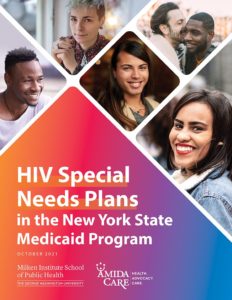New Report: George Washington University and Amida Care Detail Importance of HIV Special Needs Plans in Improving Health Outcomes and Ending the HIV Epidemic
October 13 2021
George Washington University Milken Institute School of Public Health, together with Amida Care, released a new report outlining the history, challenges, and impressive results of HIV Special Needs Plans (HIV-SNPs) in New York State, which can be a model for the nation. The report documents how this approach to health care plays a critical role in the state’s progress toward ending the HIV epidemic. The report also demonstrates the value of HIV-SNPs as a model for health systems to meet the challenges of caring for individuals living with complex conditions, including HIV.
The report, HIV Special Needs Plans in the New York State Medicaid Program, provides an overview of HIV-SNPs, which were officially introduced by New York State Medicaid in 2003, as an alternative to “mainstream” managed care plans. HIV-SNPs develop and implement interdisciplinary care plans for enrollees, connecting them with specialty care providers and other resources that take into account their complex health histories. HIV-SNPs are designed to facilitate access to care for individuals who experience significant barriers to living their healthiest lives. These specialized health plans help them address needs including—but going far beyond—doctor appointments and prescriptions refills.
HIV-SNPs are proof of concept that payers, providers, and members can all work together to the benefit of each. The HIV-SNP model of comprehensive health care works to combat the isolation and poverty concentrated in neighborhoods that are disproportionately impacted by HIV, especially in communities of color and in LGBTQ communities. Not every state in the U.S. is able to implement the HIV-SNP model, but many can. Doing so brings us closer to ending the national HIV epidemic once and for all.
of comprehensive health care works to combat the isolation and poverty concentrated in neighborhoods that are disproportionately impacted by HIV, especially in communities of color and in LGBTQ communities. Not every state in the U.S. is able to implement the HIV-SNP model, but many can. Doing so brings us closer to ending the national HIV epidemic once and for all.
The model’s holistic approach has proven particularly effective in supporting New Yorkers living with HIV who are aging—a cohort that continues to grow as HIV treatment becomes more effective. The U.S. health care system will need to quickly learn how to support older people living with HIV, which involves patients experiencing multiple chronic conditions associated with aging much sooner. HIV-SNPs offer their experience in care coordination, pharmacy care management, and a holistic approach to address health outcomes and health care costs as a national model.
HIV-SNPs are also breaking ground in promoting access to gender-affirming health care, which contributes to ending the HIV epidemic. By providing access to comprehensive gender-affirming care, designing comprehensive wraparound services, training staff, and understanding the complex interplay between body image and mental health, health systems can engage transgender people in the full continuum of care—including HIV prevention and treatment—and improve overall health outcomes.
While HIV-SNPs have provided valuable contributions toward Ending the Epidemic in New York State, the report concludes that their focused work has also yielded key lessons for the response across the entire country. Read the full report to learn more.
